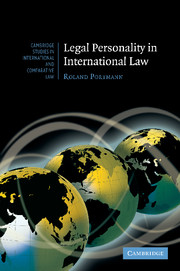Book contents
- Frontmatter
- Contents
- Foreword
- Acknowledgments
- Table of Cases
- List of Abbreviations
- Introduction
- Part I The concept of personality in international law
- Part II The conceptions of personality in international law: their origins and legal manifestations
- 4 Early doctrine and practice
- 5 The states-only conception
- 6 The recognition conception
- 7 The individualistic conception
- 8 The formal conception
- 9 The actor conception
- Part III A framework for personality in international law
- Bibliography
- Index
- Titles in the series
- References
7 - The individualistic conception
Published online by Cambridge University Press: 05 October 2010
- Frontmatter
- Contents
- Foreword
- Acknowledgments
- Table of Cases
- List of Abbreviations
- Introduction
- Part I The concept of personality in international law
- Part II The conceptions of personality in international law: their origins and legal manifestations
- 4 Early doctrine and practice
- 5 The states-only conception
- 6 The recognition conception
- 7 The individualistic conception
- 8 The formal conception
- 9 The actor conception
- Part III A framework for personality in international law
- Bibliography
- Index
- Titles in the series
- References
Summary
The individualistic conception of international personality asserts that, as a matter of fundamental legal principle, the individual human being is an international person and, as such, has certain basic international rights and duties. The conception as presented here was forcefully put forward by Hersch Lauterpacht before and immediately after World War II. However, Lauterpacht was neither the only nor the first advocate of an individualistic conception of international personality in the twentieth century. Various forms of this conception had been formulated earlier in the interwar period by distinguished international lawyers, including Georges Scelle, Hugo Krabbe, James Leslie Brierly, Nicolas Politis, Maurice Bourquin and Alejandro Alvarez. The common denominator of all these theories is that the status of the individual as a subject of international law does not depend on explicit or implicit expression of state will to that effect, but exists a priori. The lines of reasoning employed to arrive at this conclusion are, however, rather diverse, making use of sociological, psychological and natural law approaches, as are the consequences attached to the individualistic presumption, with some, most notably Scelle, arguing that states do not exist and that only individuals can be international persons. It was then Hersch Lauterpacht, it is submitted, who encapsulated and sometimes tempered (e.g. by reaffirming the reality of states) the different lines of reasoning into one coherent theory of the individual's international personality. It was his theory that was most influential in subsequent legal practice, particularly in international criminal law and human rights law.
- Type
- Chapter
- Information
- Legal Personality in International Law , pp. 126 - 172Publisher: Cambridge University PressPrint publication year: 2010

